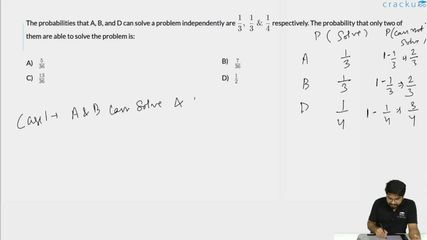The probabilities that A, B, and D can solve a problem independently are $$\dfrac{1}{3},\ \dfrac{1}{3}\ \&\ \dfrac{1}{4}$$ respectively. The probability that only two of them are able to solve the problem is:
Solution
There are three cases for exactly two solving it right :
Case I : A, B solving correct and D going wrong
Probability = (1/3)(1/3)(3/4) = 1/12
Case II : A, D solving correct and B going wrong
Probability = (1/3)(2/3)(1/4) = 1/18
Case III : B,D solving correct and A going wrong
Probability = (2/3)(1/3)(1/4) = 1/18
Therefore, total probability = 1/12 + 1/18 + 1/18 = 1/12 + 1/9 = 7/36
Video Solution

Click on the Email ☝️ to Watch the Video Solution